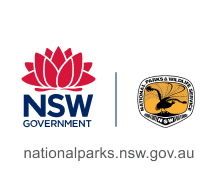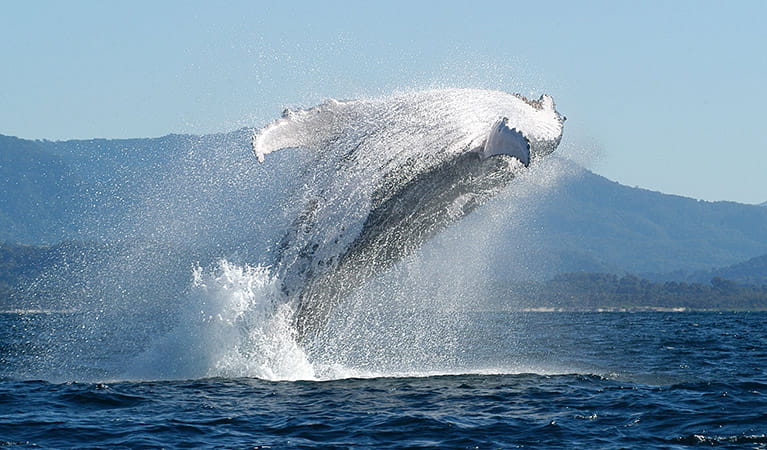School excursion
A whale of a time
Walgun Cape Byron State Conservation Area
Open, check current alerts
Overview
Discover the wonderful world of whales on this Stage 2 (Years 3-4) excursion around Walgun Cape Byron headland. This excursion is designed to support the Living World Science and Technology topic content strand.
Read more about A whale of a time
Give your students the experience of being a scientist for a day and bring them on an investigative journey through Walgun Cape Byron State Conservation Area, where they'll take an in-depth look at whale classification, ecology and habitat.
Students will study the life cycle of a humpback whale, how they are classified based on their observable features, and the interrelationships they have with other key species and the marine environment. Students will learn how scientific knowledge assists us to make predictions and describe patterns and relationships in the environment.
Students will work scientifically to collect data using measurements and observation, and use graphs to represent their data. They'll leave the Cape with a fresh appreciation for real-world science and how it can be used for preserving and managing the environment.
For program outline, safety and practical information about this excursion, see info for teachers
| Stage | Stage 2 (Years 3-4) |
|---|---|
| Learning area | Science and Technology |
| Student outcomes |
ST2-4LW-S. Compares features and characteristics of living and non-living things ST2-1WS-S. Questions, plans and conducts scientific investigations, collects and summarises data and communicates using scientific representations ST2-2DP-T. Selects and uses materials, tools and equipment to develop solutions for a need or opportunity |
| Objectives |
Students will:
|
Excursion details
- When
Weekdays during school term.
- Availability
- Guided. Available on request.
- Duration
- 2hrs
- Grading
- Easy. Guided activities in a national park, on formed and uneven bushwalking tracks and on a grassy picnic area. The track from the lighthouse to Wategos Beach is around 1km.
- Price
-
$12 per person (includes GST). Minimum fee of $240.00 (includes GST). Teachers and other staff are free.
- Accessibility
- Hard
- Meeting point
- Cape Byron Lighthouse precinct end of Lighthouse Road, Byron Bay. Groups meet on the verandah of the northern side of the Lighthouse Keepers Cottage (visitor centre).
- Equipment
provided - Yes
- Booking
- If you would like to organise a NPWS school excursion please get in touch with local staff or use the 'Enquire' link for the online form.
Local alerts
For the latest updates on fires, closures and other alerts in this area, see https://www.nationalparks.nsw.gov.au/education/stage-2-science-technology-whale-time-walgun-cape-byron-state-conservation-area/local-alerts
Operated by
- School excursion inquiries - Byron Bay
- 02 6639 8300
- npws.tweedbyron@environment.nsw.gov.au
- Tallow Beach Road, Byron Bay NSW
Park info
- in Walgun Cape Byron State Conservation Area in the North Coast region
- Walgun Cape Byron State Conservation Area is open all hours, but may have to close at times due to poor weather or fire danger.
- Cape Byron Lighthouse lawn is open 8am to sunset.
- The Maritime Museum in the former Lighthouse Keeper’s office at the base of the lighthouse is open 10am to 4pm daily.
- Opening before 8am for events or disabled access can be arranged by prior notice – contact NPWS Byron Bay office during business hours 02 6639 8300.
-
Park entry fees:
Cape Byron Lighthouse lawn and Information Centre: $10 per vehicle per hour/$4 per hour motorcycles. Maximum 1 hour per vehicle per calendar day, including all NPWS annual passholders.
Bawaii rest area, Cosy Corner, and The Pass: $5 per vehicle/motorcycle per hour. Tap and pay card or phone payments accepted at pay machines. Cash and credit cards accepted at Walgun Cape Byron Information Centre.
Coach entry: $30 per coach up to 30 seats; $57 per coach 31 to 43 seats; $94 per coach 44 seats and over.
Buy annual pass.
Info for teachers
All the practical information you need to know about A whale of a time.
Program outline
- Start at Cape Byron Lighthouse precinct
- Welcome, introductions, acknowledgement of Country and safety talk
- Activity 1: Whale study (humpback whale features and characteristics), 20min
- Activity 2: Whale study (grouping animals) supported with whale artefacts, 30min
- Activity 3: Whale study (life cycle and interrelationships), 30min
- Toilet break, 10min
Getting there and parking
Get driving directions
This activity begins at Cape Byron Lighthouse and ends at the western end of Wategos Beach. To get to Cape Byron Lighthouse, take Lawson Street (which becomes Lighthouse Road) and follow it to the lighthouse. Wategos Beach is on Marine Parade, off Palm Valley Drive, Byron Bay.
Parking
Bus parking is located at the lighthouse precinct. Buses transporting students on approved programs are free. Additional vehicles will need to pay appropriate fees.
Parking is limited at excursion venues. An $8 car entry fee applies at the lighthouse. Those with NPWS Park Passes are exempt. Annual passes can be purchased online or from any NPWS office.
What to bring
Bring a hat, sunscreen, adequate food and drinking water. Fresh water bubblers are available at The Pass.
Please wear long pants, closed comfortable shoes and bring a hat and sunscreen. Be ready for all weather conditions with a jumper and raincoat. And remember to bring food and any necessary medications.
It’s a good idea to pack your belongings in a backpack rather than a plastic bag.
Maps and downloads
Risk assessment and risk benefits
Our rangers and guides have the technical skill and experience to assess the risks and the benefits of a variety of activities delivered as part of our learning programs.
We believe in including opportunities that allow students to learn and experience for themselves through exploration in the natural environment.
Please make your own risk assessment based on the information provided. Detailed potential risks and controls are provided for the site to assist teachers in risk management planning. Teachers and carers should be aware of, and consider the needs, abilities and medical conditions of students when visiting this site. The supervision of students remains the responsibility of the teacher. The school must ensure an adequate number of adult supervisors are present.
Accessibility
Disability access level - hard
Wheelchairs can access this area with some difficulty. If you have someone with special needs, please let us know in advance so that we can plan accordingly.

